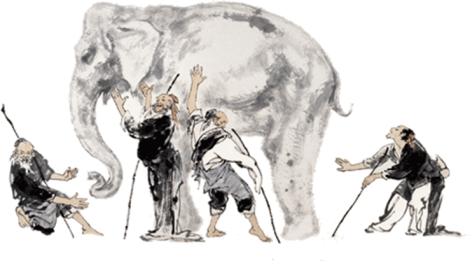 When I was growing up, this innocuous little statement was a humour detonation device in my family. Whispered innocently at just the right time - meaning the worst time - would put an instant smile on my dad‘s face…quickly from there devolving him to a shoulders shaking, eyes squeezed shut, fingers covering his mouth (as he tried not to guffaw inappropriately in the middle of some tirade of my mother’s) mess. And everyone would get in trouble and it was great fun. The line had come from a cookbook my first grade class had put together, full of recipes written by the kids. My recipe was for the kind of buns my grandmother made. The first line of my recipe was “First you take the dough.” As the legend went, my six-year-old self had proudly brought the mimeographed cookbook home and watched my parents reverently open the construction paper cover that I had lovingly decorated…
0 Comments
 In a trainer's meeting once, the matter was raised of two rather persistent problems. Two very important components of EFT were being consistently overlooked, ignored, forgotten - or were simply flying over students' heads: Specific Events and Aspects. The first one I already knew about. In spite of joking with my workshop attendees that they should consider having the words "specific events" tattooed on the insides of their eyelids so they'd never forget, I had seen over and over again that this important rule was being bypassed in their sessions. Specific events, for the uninitiated (and, too often, for the initiated as well), are where EFT's lasting effectiveness comes from...  If you wear glasses - you may be able to "look" forward to better eyesight this year :-) I'd like to share the story of how I improved mine with tapping - but first, the reason it occurred to me to do so is because I wanted to let you know about Peta Stapleton's upcoming clinical trial on EFT for eyesight improvement. She and her research team are assembling study participants for a late January start. This could be a great opportunity for some free tapping so here is the link to find out more and register your interest: EYESIGHT TRIAL https://bond.qualtrics.com/jfe/form/SV_dhUPmOs2MiT2XCm When I was at University, it was pointed out to me...  Something I’ve been explaining to clients for years - which I don’t think I’ve even told my students about - is about how healing looks. Specifically, that it’s not a straight line on a graph. The analogy I’ve found myself offering, time and time again, is that of a slab of iceberg dropping into the sea. I saw a video once, entitled something like “Caught on Camera: Huge Iceberg Collapsing”, in which the first five minutes is just this massive frozen monolith towering over the Antarctic sea, nothing but the occasional tiny chunk of snow tumbling off and splashing into the water a hundred feet below. It really looked like nothing was happening - or was going to happen. Then, suddenly, in the last 20 seconds of the video...  Are you interested in sharing Emotional Freedom Techniques (EFT) with a friend who's unfamiliar with it? Here's a straightforward way to introduce them to this unique and versatile practice. Start by explaining that EFT, short for Emotional Freedom Techniques, is a form of therapy that involves a unique approach to addressing emotional challenges. It's often guided by an EFT practitioner, who helps in navigating through the process. EFT can be likened to a versatile toolbox for emotions, aiding in navigating various emotional states, from general unease to improving overall well-being. It's a calming practice involving specific physical actions - tapping on certain body points - which is designed to offer relief and is a powerful form of tapping therapy. When discussing how EFT can be beneficial in daily life, mention its role in managing emotions like anxiety. EFT provides a method to calm and soothe oneself, making it an effective tool for emotional regulation. EFT is also practical in addressing issues related to food and eating. It offers support in managing cravings and fostering healthier attitudes towards eating, in other words, tapping for weight loss! Highlight the versatility of EFT, emphasizing that it's not limited to just anxiety or weight management. EFT can be applied to a wide range of emotional challenges, from boosting confidence before a presentation to navigating personal hurdles, making it a flexible and valuable tool for emotional well-being. In summary, when introducing EFT, focus on its unique approach to emotional challenges, the guided practice by an expert, and its versatile, toolbox-like quality for navigating emotions. Also, discuss its role in managing anxiety and promoting healthier relationships with food. This will effectively communicate EFT's potential as an adaptable and effective form of tapping therapy. Are you interested in sharing Emotional Freedom Techniques (EFT) with a friend who's unfamiliar with it? Here's a straightforward way to introduce them to this unique and versatile practice.  I had a thought: It takes emotional courage to begin the journey of working on your trauma with EFT. But only to begin. Why? Because we assume the process of healing the trauma will involve re-exposing ourselves to it. That the trauma being uninstalled from our body will be as painful as it was when the trauma was being installed. As bad going out as it was going in. Like ripping off a BandAid…only a million times worse. No wonder it’s the LAST thing we want to do! No wonder it takes EMOTIONAL COURAGE to step into the process… But, unlike so many other modalities, EFT is NOT a painful process. In fact, the techniques for dealing with trauma are called the Gentle Techniques - because that is exactly what they are. So, though it might take courage to sign up for what you believe will be a necessary (but awful) experience of healing, you VERY SOON discover that it’s nothing of the sort. In the hands of a properly trained, trauma-informed practitioner who is using Clinical EFT, the experience of healing not only brings the relief that comes with being freed at last from the residue of those bad experiences, it does it in a WAY that doesn’t require ANY COURAGE. Because it’s not painful. It’s not awful. It’s not retraumatising. I asked ChatGPT to write this blog post and got the below result. No wonder you thought healing trauma would require emotional courage all the way through! Most of the world, basing the assumption on experiences with exposure based therapies like CBT, thinks it’s a tough process from start to finish. Some of what's below is true for EFT, like the part about patience...but lots is not. Whose version do you prefer? :-) ************ Trauma can have a profound impact on an individual's life, leaving lasting scars that affect everything from their relationships to their ability to function day-to-day. While many people may understand that healing from trauma is an important step towards recovery, it can be difficult to take the first steps towards that journey. This is where emotional courage comes in, as it takes a great deal of strength and bravery to face the pain of trauma head-on and begin the process of healing. First, let's define emotional courage. Emotional courage refers to the ability to confront and manage difficult emotions in a healthy way. It involves being willing to be vulnerable, to face the unknown, and to take risks despite the possibility of failure or rejection. Emotional courage is not about ignoring or suppressing negative emotions but rather embracing them and learning from them. When it comes to trauma, emotional courage is essential for healing. Trauma can be deeply painful, and it's natural to want to avoid or suppress those emotions. However, avoiding the pain of trauma can lead to more significant issues such as depression, anxiety, and substance abuse. On the other hand, embracing the pain and working through it can lead to a greater sense of self-awareness and empowerment. So, why is emotional courage necessary for healing trauma? Here are some reasons:
In conclusion, healing from trauma takes emotional courage. It involves being vulnerable, facing fears, self-reflection, and perseverance. While the journey may be difficult, it's essential to confront the pain of trauma to move past it and live a fulfilling life. If you're struggling with trauma, remember that seeking help is a sign of strength, not weakness, and that healing is possible with time, effort, and emotional courage.  Imagine an orchestra of 20 musicians. Eighteen of them are playing well and have instruments that are perfectly in tune. Two of them, however, are playing out of tune. How good does that orchestra sound? Kinda ruins the overall effect, right? Now imagine that each one of those musicians in that orchestra are parts of you. Only two out of twenty are wounded and need healing but the overall effect on your life is discord. You feel broken. It feels hopeless. The two parts that aren’t healed are taking all your attention and affecting your whole existence so you aren’t able to enjoy the wellbeing available to the other eighteen parts of you! As you heal with EFT, you do experience shifts and for a while these shifts make it feel like everything is fixed. So, it can be confusing when negative moods return. Did the result not stick? Was it not permanent? The answer, if you are doing Clinical EFT and not just surface Tapping, is yes! You DID create permanent change. It’s just that now you’re back to noticing the parts that are next in line to be “tuned.” And, just like with an orchestra, all it takes is one or two players out of tune to spoil the music and make you say “This orchestra sucks!!”, even though the majority of players are doing well. That’s why it’s a journey, a process, and not an instant overnight fix (for most things). Just because you still feel symptoms, emotions, have thoughts that you don’t want, it doesn’t mean you haven’t made significant progress. The next time you find yourself questioning your results, try to focus on the parts of you that have improved. Remind yourself of how far you’ve come. And then turn your attention to the parts whose turn it now is for healing.  I just realized that, without even knowing it, I have been celebrating the ten year anniversary of my discovering EFT, healing my depression and changing my life! About a week ago, I was lounging on the guest bed in my friend Carole’s house in Los Angeles, recovering from the intensive 4 day Clinical EFT training I had conducted in San Diego a couple of days prior. I was looking out the windows at the green canopy of foliage, musing about how happy I had felt on this trip so far - happier than usual - and how much the trees had grown since that time I stayed in the little granny flat below… Thinking about my stay in the granny flat made me smile. It was a joyful time, that month all those years ago. So joyful that I had kept jotting down details in a little notebook, not wanting to forget...  A couple of days ago, a trainee emailed me a really great question: "How do you feel when you run sessions for others and you are tapping on yourself to direct the person but you are also stating their problems back to them? On an energetic level, how do you think this effects us as healers? Do you have techniques to teach us how to not let the affirmations for them effect us, or how to not take it on? This is my main concern from a spiritual point of view." ANSWER: First of all, I LOVE this question!  For a while now I've been using two metaphors that seem to resonate with tapping clients and students. One is what I have seen referred to as "the spinning wheel of death." If you use a Mac, it's that multicolored little pie icon that spins eternally when the computer is stuck somewhere just short of frozen. That point in a process where you've clicked some button and the computer goes to work on whatever command you gave it....and the spinning wheel indicates "okay, just give me a moment here" and that moment turns into... an eternity. Your computer is, for all intents and purposes, unusable until you perform a hard reboot by turning it off and back on. For people without Macs (though I am sure there is a PC equivalent), the metaphor I use involves an anaconda snake trying to eat a cow and getting stuck with the cow half swallowed. Without manual intervention, that cow isn't coming back out and yet the snake isn't big enough to finish the job of swallowing the cow! As with the tech analogy, everything stops. Forward progress is impossible and there's no elegant way to back up. What both these examples have in common is they illustrate a process being interrupted by something TOO BIG. Something that the process can't cope with. The Mac had too many programs running simultaneously and the snake's ability to unhinge its jaw exceeded its throat's potential to expand. Result: Stuck. |
THIS IS WHERE...
I share my thoughts, inspirations and any discoveries I want to pass along. ARCHIVES
June 2024
CATEGORIES
|
| Freedom Techniques | BLOG |
Copyright (c) 2013-2024 Freedom Techniques. All Rights Reserved.
Terms of Use and Privacy Policy Agreement of Services
Terms of Use and Privacy Policy Agreement of Services